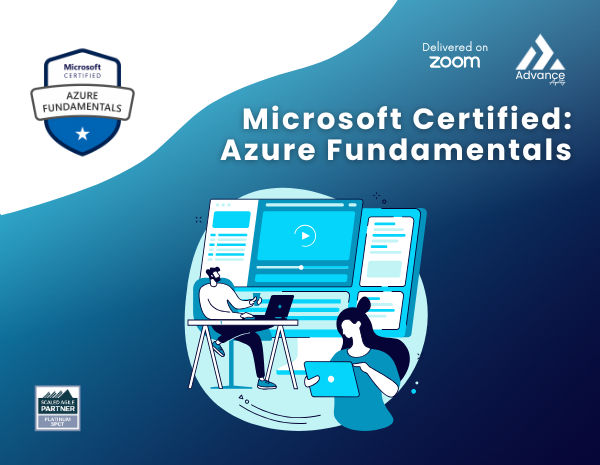Register Today and get 10% off on all our courses
Apply this Coupon Code: DIS10
Register Today and get 10% off on all our courses
Apply this Coupon Code: DIS10


The AZ-900T00: Microsoft Azure Fundamentals course offers a clear introduction to cloud computing concepts and core Azure services. It covers cloud models, benefits of cloud adoption, and key services such as IaaS, PaaS, and SaaS
Date
23 Jul
Time
10:00 AM - 6:00 PM (EDT)
4.9/5
4.9/5
+
+
+
+
The Microsoft Azure Fundamentals (AZ-900) course is an 8-hour virtual instructor-led training that introduces cloud computing concepts and core Azure services. It covers cloud models, benefits of cloud adoption, key Azure services like IaaS, PaaS, SaaS, and core architectural components such as compute, networking, and storage. The course also includes identity and security management using Azure Active Directory, cost management, governance tools, and monitoring with Azure Monitor. Hands-on labs and practical exercises reinforce learning by enabling participants to work directly with Azure resources. This course prepares learners for the AZ-900 certification exam and is ideal for beginners seeking foundational cloud knowledge without requiring prior scripting skills
• Define cloud computing
• Describe the shared responsibility model
• Define cloud concepts and models, including public, private, and hybrid
• Identify appropriate use cases for each cloud model
• Describe the consumption-based model
• Compare cloud pricing models
• Describe the benefits of high availability and scalability in the cloud
• Describe the benefits of reliability and predictability in the cloud
• Describe the benefits of security and governance in the cloud
• Describe the benefits of manageability in the cloud
• Describe Infrastructure as a Service (IaaS)
• Describe Platform as a Service (PaaS)
• Describe Software as a Service (SaaS)
• Identify appropriate use cases for each cloud service (IaaS, PaaS, SaaS)
• Describe Azure regions, region pairs, and sovereign regions
• Describe Availability Zones
• Describe Azure datacenters
• Describe Azure resources and Resource Groups
• Describe subscriptions
• Describe management groups
• Describe the hierarchy of resource groups, subscriptions, and management groups
• Lab: Explore the Learn sandbox
• Lab: Create an Azure resource
• Compare compute types, including container instances, virtual machines, and functions
• Describe virtual machine (VM) options, including VMs, Virtual Machine Scale Sets, availability sets, Azure Virtual Desktop
• Describe resources required for virtual machines
• Describe application hosting options, including Azure Web Apps, containers, and virtual machines
• Describe virtual networking, including the purpose of Azure Virtual Networks, Azure virtual subnets, peering, Azure DNS, VPN Gateway, and ExpressRoute
• Define public and private endpoints
• Lab: Create an Azure Virtual Machine
• Lab: Configure network access
• Compare Azure storage services
• Describe storage tiers
• Describe redundancy options
• Describe storage account options and storage types
• Identify options for moving files, including AzCopy, Azure Storage Explorer, and Azure File Sync
• Describe migration options, including Azure Migrate and Azure Data Box
• Lab: Create a storage blob
• Describe directory services in Azure, including Azure Active Directory (AD) and Azure AD DS
• Describe authentication methods in Azure, including single sign-on (SSO), multifactor authentication (MFA), and passwordless
• Describe external identities and guest access in Azure
• Describe Azure AD Conditional Access
• Describe Azure Role-Based Access Control (RBAC)
• Describe the concept of Zero Trust
• Describe the purpose of the defense-in-depth model
• Describe the purpose of Microsoft Defender for the Cloud
• Describe factors that can affect costs in Azure
• Compare the Pricing calculator and Total Cost of Ownership (TCO) calculator
• Describe Azure Cost Management Tool
• Describe the purpose of tags
• Lab: Estimate workload costs by using the Pricing calculator
• Lab: Compare workload costs using the TCO calculator
• Describe the purpose of Azure Blueprints
• Describe the purpose of Azure Policy
• Describe the purpose of resource locks
• Describe the purpose of the Service Trust portal
• Lab: Configure a resource lock
• Describe Azure portal
• Describe Azure Cloud Shell, including Azure CLI and Azure PowerShell
• Describe the purpose of Azure Arc
• Describe Azure Resource Manager (ARM) and Azure ARM templates
• Describe the purpose of Azure Advisor
• Describe Azure Service Health
• Describe Azure Monitor, including Azure Log Analytics, Azure Monitor Alerts, and Application Insights

Get professional
guidance
from
learning
advisors

Upskill and reskill your team with our corporate training programs.
Reach Us

The AZ-900T00: Microsoft Azure Fundamentals course prepares you to earn the Microsoft Certified Azure Fundamentals Certification It helps develop and strengthen fundamental cloud concepts and cloud services.
AZ-900 is a recommended training aligned with AZ-900 exam objectives. This Microsoft-certified azure fundamentals Course mainly uses the Azure portal to create services and does not require scripting skills. This Azure training provides an Azure pass and lab environment(optional). The AZ-900 course combines demonstrations, lectures, and hands-on lab experience. This Azure Fundamentals course will also help prepare learners for the AZ-900 exam.
Getting this training makes your basics clear in cloud computing, especially Azure, and helps you grasp concepts easily as you progress towards an advanced level of courses in your cloud journey.
The AZ-900 training will be provided by Microsoft Certified Trainers (MCTs) with extensive domain knowledge and over a decade of training experience. in cloud concepts and cloud services..
After completing the AZ-900 Certification Course, participants can look for jobs in many sectors, such as technology, finance, healthcare, retail, data management, government, and manufacturing, which increasingly use cloud computing solutions.
Completing the course Microsoft Azure Fundamentals Course or AZ-900 makes course participants ready for entry-level roles, which include a cloud support associate, junior cloud consultant, IT support specialist, technical sales representative, help desk technician, data analyst, and more. They have an added chance to obtain a role like systems administrator and network administrator for more career progress and opportunities in cloud computing.
• Validates cloud computing skills, making one more attractive to an employer.
• Opens doors to better IT positions and roles with further responsibilities.
• Provides foundational knowledge in Microsoft Azure services, crucial for organizations migrating to the cloud.
• Puts you in positions that many times attract higher salaries in an expanding job market.
• The certification, being worldwide, enhances your creditability as a professional.
• Shows an active role in professional development that will set you apart from non-certified peers.
Yes, the AZ-900 training course extensively addresses all the latest industry updates regarding Microsoft Azure Fundamentals. This is supplemented with current best practices and upcoming technologies related to cloud services management to ensure that participants are equipped with the most modern knowledge they may need in today's cloud environments. The curriculum is periodically refreshed to reflect recent changes and developments in Azure in terms of new services and features which, in turn, helps improve how relevant the training content is.
Yes, the AZ-900 Training course has hands-on labs and practical exercises that let participants apply their learning in real-world scenarios. This hands-on approach makes it easy to understand cloud concepts and enhances skills through direct interaction with Azure services.